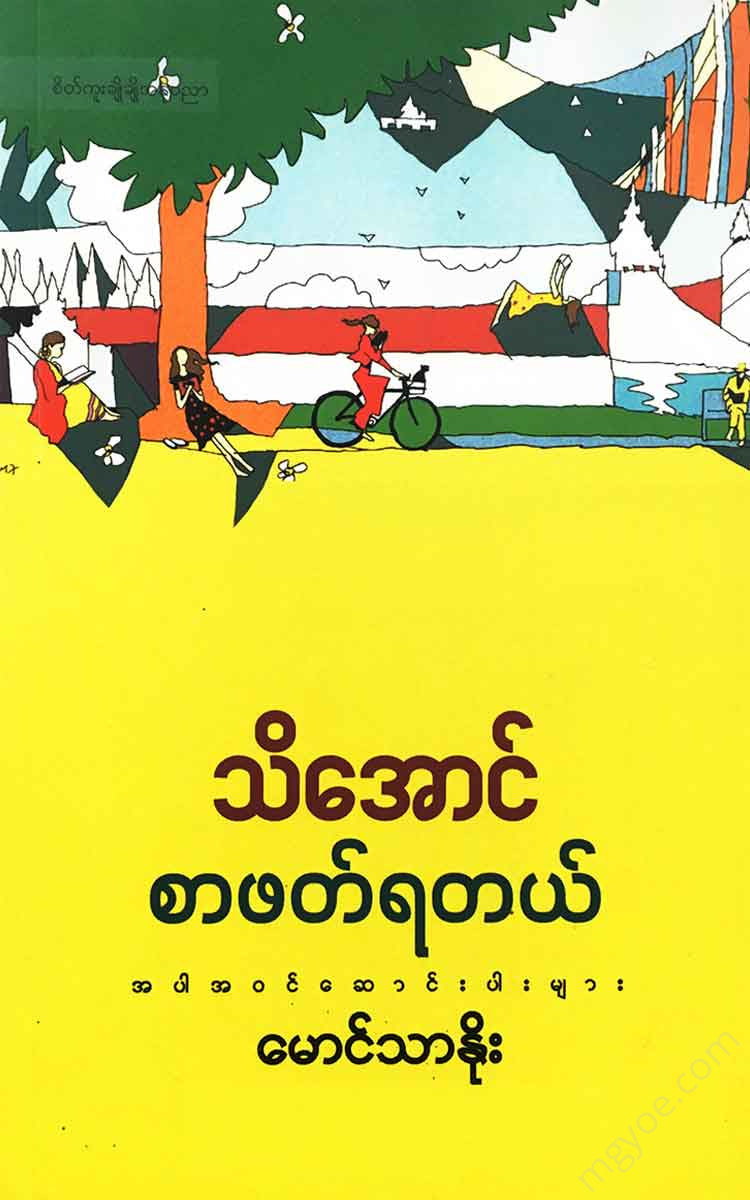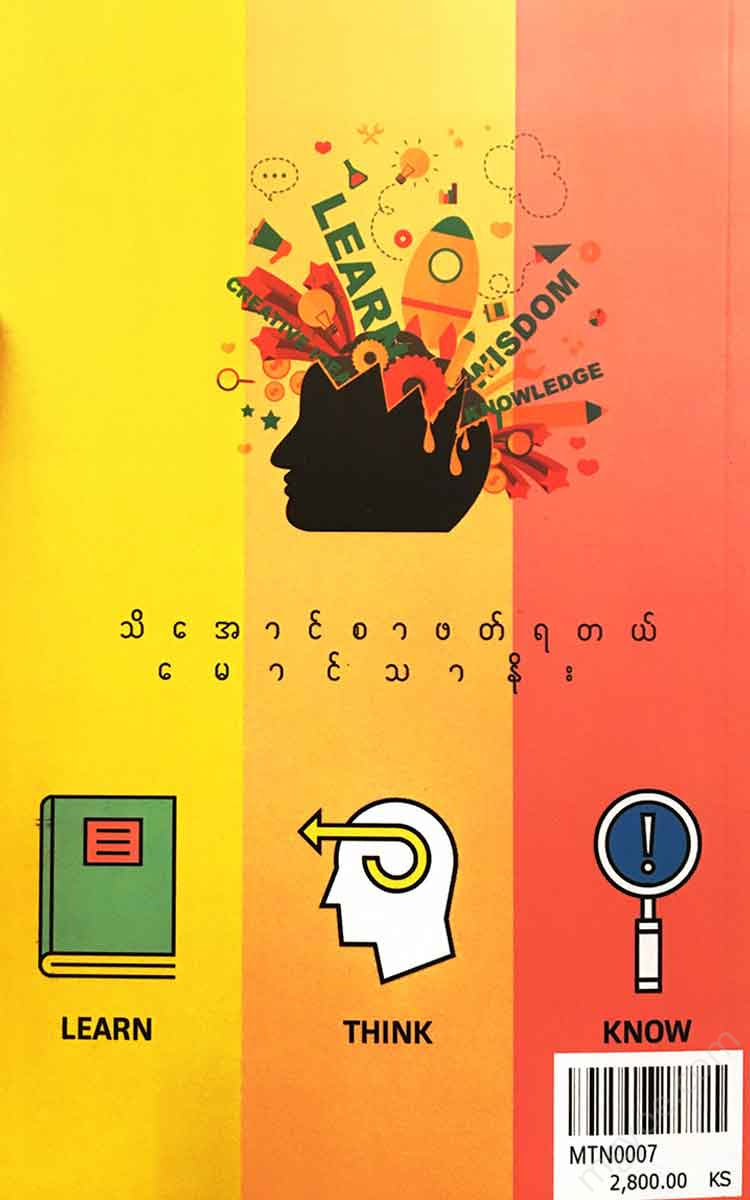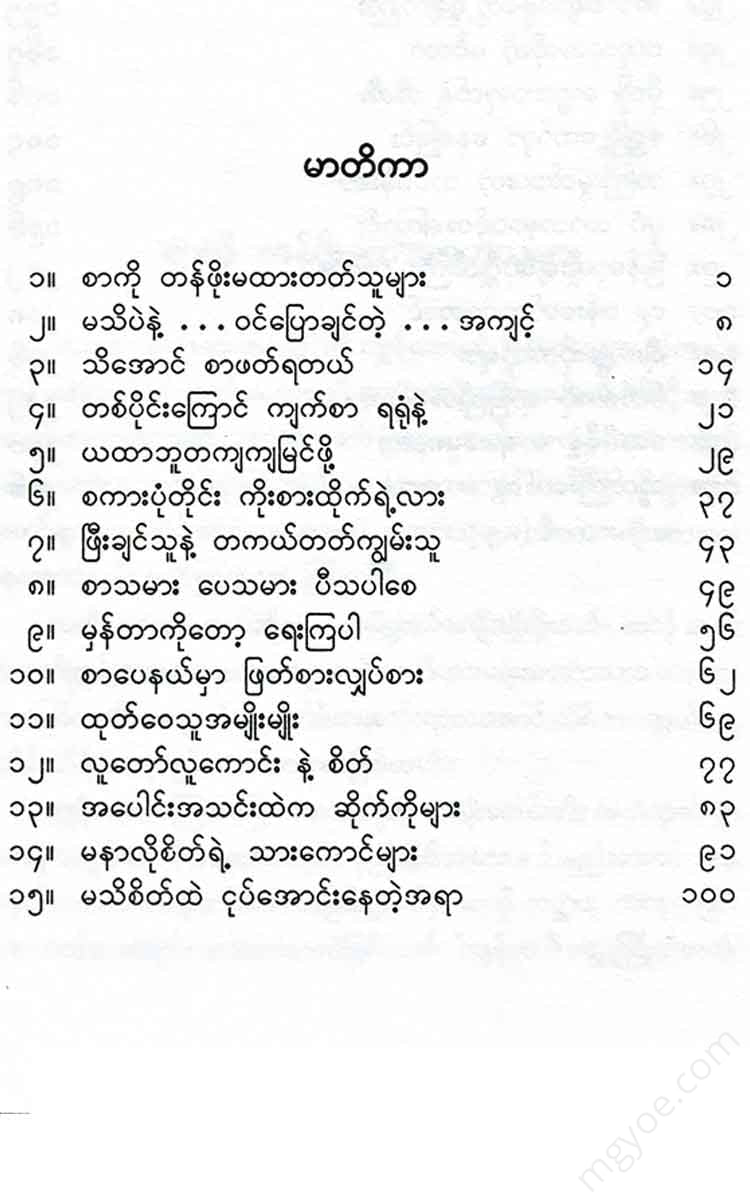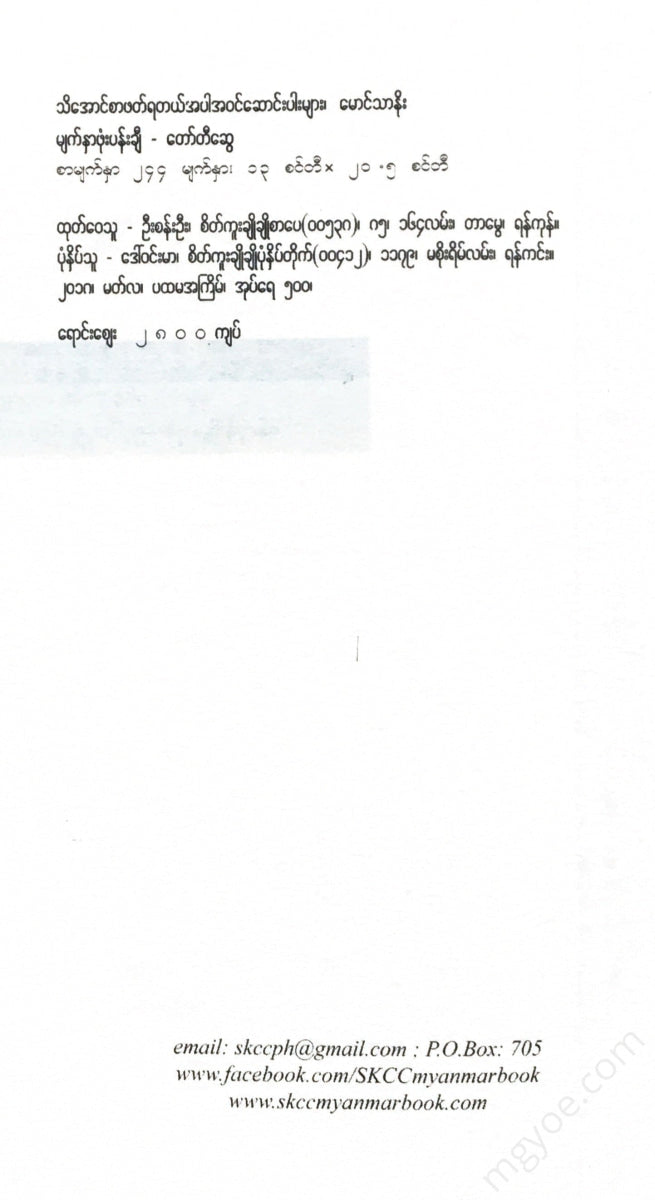စိတ်ကူးချိုချိုစာပေ
Maung Tha No - I can read to know.
Maung Tha No - I can read to know.
Couldn't load pickup availability
Those who do not value letters
We Burmese people say, "One letter is one god." At first glance, it may seem like a cliché, but it shows how much we respect our own letters. It is a very respectable attitude. The problem is that many of our people (including those who are not ignorant of literature) do not know that this saying is worthy of respect.
Respecting a letter has various meanings. It means being careful to write a letter carefully, from the beginning to the end, so that there are no mistakes, and it also means being respectful, holding on to it, and maintaining it so that it does not get lost or distorted.
I often write with as few spelling, pronunciation, and wording errors as possible, and I also respect the letter. “I like the novel” (writing “I” and “I like” without separating it) is a careless and careless way of writing, while “I like the letter” (writing “I” and “I like” with a little space between the letter “I” and the letter “I like”) shows that I am thoughtful and thoughtful. I also respect the letter by using paragraphs, single quotes, commas, and apostrophes in their correct places.
Just yesterday, in a letter I wrote to a magazine, I wrote, “I went to his house and got lemonade.” I must have misunderstood the letter. After thinking about it, I realized that (the monk) was “getting lemonade.” This is not so bad. In a book, I wrote, “I thought about teaching the wise king’s son the skills of a prince.” (The king was wise) and corrected it to “the wise king’s son” (the son was wise). When the book came out, it was still “the king’s son.” I didn’t correct it. There are many such things. .
The worst disrespect is to erase the letter. I wrote it with all my heart. I can't replace it. It hurts. He easily replied, "I'll write a new one." I knew that if I wrote a new one, I would get a new one. But the new letter I wrote was another one. It could be better than the previous one, or worse. It wasn't the previous one anymore.
A person who creates a letter, like parents who raise their children, has to squeeze out a piece of his own letter with great difficulty. The more artistic it is, the more difficult it is. A poem can be compared to a pearl in the oyster's heart. (It's different for someone who writes a poem while sitting in a tea shop, chatting. He has to think about whether he is a writer.)
We believe that we write with effort. Now I am writing a prose article. But I have to think about whether to write “try” or “try hard” and then write “try hard”. In the previous paragraph, I had to think about whether to write “author” or “writer” and then write “creator”. These are the habits that come with learning English. It must be funny for those who know how to write at least a few letters.
Imagine how it would feel to someone who has written such a letter, and who has been secretly writing it, to hide the letter that has come out of their heart. Among those who are so carelessly hiding the letter, the first ones to notice are the young people in the area who are crazy and want to publish a book. For me, it is rare for someone to know me. It is rare for someone to come through an acquaintance. The young people in our township, the teachers and readers, are all starting to ask for manuscripts. When I write, some books are published, some are not. They are published or not, and the books often do not reach me. If they do not come out, the manuscript is empty. If they do come out, you have to find the book and ask for it and buy it.
So my letters have disappeared from the Upper Anyang region, the Lower Delta region, Shan State, Christian Youth, and various universities and colleges. The other day, I met a friend of mine, a professor, and he mentioned that I was republishing old English articles in The Light magazine. He told me that my English articles had been published in the college magazine he had previously edited. I told him that I had not received the book, and he said that he would look for them. I still haven’t received them.
Sagaing is my hometown. I am a tenth grader from Sagaing No. 1 High School. They asked me for a manuscript through a friend because they were going to publish a centennial publication for the school. I wrote one in Burmese and one in English. I heard that it had been published. I had never seen the book. When I went to Sagaing, people who had read it were discussing my article. I told them that I had not read it yet. I asked my younger brother to help me. I had given it to Ko Kyaw Kyaw (Heman Offset) in Yangon. When I asked Ko Kyaw Kyaw, he said he would not give it to me. After asking this question many times about the possibility of getting a book that I had written, I worked hard and diligently until the book finally came into my hands. It was time to invest in gold.
They were going to publish a commemorative book of the artist Pao U Thet, and they asked me for an article. They also asked me to translate some of Ko Pao U's sayings into English. I wrote the article and sent it to the 33rd Street Literary Office to arrange a time. When the book came out, some translations came. The article did not come with it. It was not rejected. Literary Office is also being done by my students Khin Myint Wai and Aung Myat Kyaw. When I asked them, they gave it to me. They also gave it to me. The translation has come. It is strange that the article is not included. Thinking about the possibilities, it seems that among those responsible for publishing Pao U Thet's book and those close to them, there is a mentally ill person who has a grudge against me. (He did this because he was not mentally ill; if he was mentally ill, he would not have done it.) I thought about it from all sides and concluded that he must have stolen my manuscript and destroyed it.
One person who does not just secretly but openly hides is Ko Nyo Mwai from Amman Thit Saper. He is the publisher of my “O Mar Kaung Yam”. In addition to the various English translations of O Mar Kaung Yam, which I took from Fitzgerald himself, it was really laborious and time-consuming to put forward notes for each version. It is over thirty printed pages. Why did Ko Nyo Mwai hide it? He was traveling and gave him the manuscript. When I returned, I found out that it had been lost, so I had to put forward four or five large books and take notes for over thirty printed pages. When my friends told me about this, a novelist told me that Ko Nyo Mwai had also had her manuscript hidden in the same way.
When we were planning to relaunch Pan magazine, Ko Pe Myint and Ko Khin Maung Toe (Moe Meik) came to my house. After discussing and giving me the assignment to write about international fiction, I wrote about Salman Rushdie. Then I wrote about Wijjadhar Knight Paul. I wrote about it and soon after it was announced that he had won the Nobel Prize. Then their editorial board changed. Before that, Khin, I wrote a long article about the three-volume novel A Suitable Boy by the Indian writer Vikram Seth. It was not easy to write. I did not own the book. I got it from the British Council Library. I borrowed only one copy at first. So I reserved the remaining two and three and borrowed it the next week. I had to borrow it and read it, and then when I finished writing, the manuscript was lost due to a change of editor. When I told Ko Pe Myint and Ko Khin Maung Toe that I had met them, they forgot about it.
So, as time passed, my university friend Ko Han Htun (former government grain mill) brought a young man to me one day and introduced him. He was now the publisher of Pan Magazine. He gave me a small manuscript. He gave me an appointment. I had learned a lesson from writing about foreign novels in Pan, so I wrote about my own Burmese classic literature. It didn’t take a month, it didn’t take two months, it didn’t take three months. I thought, “They don’t want to write about classic literature because they are young,” and I printed out a new copy of the manuscript from my computer and sent it to Ma Hay Thi. Ma Hay Thi’s editorial team sent it back saying, “It’s in Pan,” and I found out that my manuscript had been printed. I hadn’t seen the book until March 13, when I was writing this.
This is just a small retelling of my experiences as far as I can remember. There are countless cases of lost manuscripts and books that I can no longer remember. But I was relieved to learn that I was not alone when I read Maung Wan Tha’s “Second Thought” the other day. When Maung Wan Tha showed them the Bago National School Golden Jubilee Magazine, my friend, the poet, said, “Here is my poem too.” He then copied it. An editor who was once a magazine editor told me that if their magazine asked for a manuscript and included it, they would never give me a manuscript fee or a book fee. Not just a magazine, but even a whole Bible, when I asked for it and it was published, I have never met anyone in the world who would not give me a book fee or a manuscript fee.
This is about people who don’t respect literature. Most of the magazines and book publishers I write for don’t include them. They charge a small fee for a manuscript (maximum 2,500 won per article, minimum 1,500 won) but they do send the manuscript to your door. If it’s from abroad, it’s more polite. The other day, they included my translation of Min Thuwan’s poem in their book, and the UN UNICEF regional director wrote to me to express his regret because the book was delayed due to some reason. When U Aye Myint published the book of Myanmar Traditional Paintings, the Toyota Foundation hosted both the author and the translator, U Aye Myint, and offered gifts and a manuscript fee. Franz Eppert , who published a German Myanmar poetry book since 1965, didn’t pay for my translation, but he still sent the book. The German photographer and Austrian writer who published Burma (Myanmar) the Golden, who used his poem, are no different from the Burmese people I mentioned earlier. They couldn’t even send the book. The picture does not have the poet's name. The translator's name is mine, so I'm the poet. There is one thing. I don't know if I asked Franz Eppert for permission before the book was published. At that time, when this book had not yet arrived in Myanmar (1982), my friend, the American linguist Julian Wheatley , bought it and gave it to me as a gift, so I got my hands on the book with its many photos. Now, this book is also available for purchase at Inwa.









